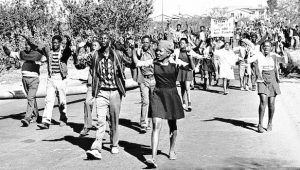
Only Communist Revolution Can End Capitalism’s Racism
SOUTH AFRICA— “From the masses to the masses,” the Chinese communists used to say before they became state capitalists. The slogan mapped out how revolutionary ideas could be developed. Change starts with mass action. It is then examined for its strengths and weaknesses by their communist party before it is relaunched as a revolutionary strategy. We should apply this way of thinking as the 55th anniversary of the Soweto uprising approaches.
No-one outside of Soweto would have thought twice about the peaceful demonstration that the students at Orlando West High School were planning for June 16, 1976. Sure, they would have agreed with the students’ demands (that lessons be taught in English, not Afrikaans) but then they would have turned their attention to more revolutionary issues.
The demonstration was peaceful, as planned, until the cops met it with a hail of bullets. The local authorities had decided to intimidate the students. Instead, they inflamed them. Over the next several months teenagers (and pre-teens, too) ran at the police. They were arrested, tortured and sometimes killed in prison, but they kept marching and marching. They lost all fear. Nothing was left but political commitment to smash racism.
The struggle spread beyond Soweto to every township in South Africa. Between 1980 and 1985, there was not one semester without a major boycott. In 1984, over half a million students in over 60 townships boycotted school. By 1985, cops were arresting kids as young as seven years old! The word “Soweto” inspired anti-racist action the world over. Just as the Chinese in their communist days used to say, “A single spark can start a prairie fire!”
And what a fire! It became obvious when they walked out of schools that the State had lost control over them. Ideas like “getting an education and getting ahead” or “ensuring your future by passing exams” or even “teach us in English” no longer appealed to them. Now, instead, the power of collective action gave them the chance to change the world. They deepened the critique of capitalist education by raising the new slogan “Liberation before Education.”
From the start, the students turned to their parents, who were industrial, domestic and service workers. They organized stay-aways, rent strikes, boycotts, mass meetings and marches. The State answered with murder and mass repression. The youth turned funerals of their fallen comrades into mass demonstrations.
The State then extended credits to the black middle classes. It recruited them into local township government which, in turn, tried to raise rents, water and electric rates as well as build new police forces. The youth led the community response: they burned local government buildings, executed new police and informers, and threw mayors out of office. In 1985, 240 black officials and 27 black mayors either resigned or fled to special centers for safety.
The power of the insurrection came from the class consciousness of the masses. In the Townships it over-ran the State-sponsored counter-revolutionary black nationalism.
This insurrectionary class consciousness reached its height in 1984-85. Stay-aways protested rent and transportation increases. Enforced by community groups, they called on workers to stay away from work by blocking access to essential mass transportation.
In the Vaal triangle they hit the industrial heartland. The State responded by sending in 7,000 troops to do house-to-house searches. This was a mistake. It showed that the State no longer feared only the militants: it now feared the whole working class! This shift in attitude was not unnoticed. Insurrectionary working-class consciousness now developed a powerful new slogan: “No More Heroes!”
This forced the State and its capitalist backers to promote the heroes of Robben Island: the African National Congress (ANC) and Nelson Mandela. The masses falling for this has set back the advancement of the South African working class. It’s true that, from Sharpeville to Marikana, imperialist capitalism has ruled South Africa. But defeatism has no place as we approach the 55th anniversary of the great Soweto uprising.
Understanding this process is the key for us now. The vital link in the chain “From the masses to the masses” is the development and independence of our communist party, ICWP.
The old South African Communist Party was too intimately tied to the capitalist ANC. It did not aim for communist revolution to smash capitalism. It had no analysis that racism (as apartheid, Jim Crow or whatever form) was a product of capitalism and could not be eliminated unless capitalism was replaced by communism. Therefore, it was unable to advance the insights the masses had produced in their epic battle.
The collapse of the old makes room for the new: the International Communist Workers’ Party. Mobilize the Masses for Communism!

